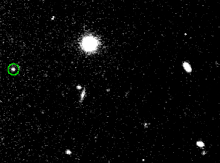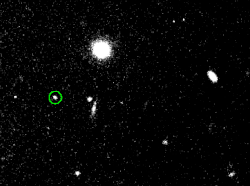Jupiter LI
Jupiter LI, provisionally known as S/2010 J 1, is a natural satellite of Jupiter. It was discovered by R. Jacobson, M. Brozović, B. Gladman, and M. Alexandersen in 2010.[2][3][4] It received its permanent number in March 2015.[5] It is now known to circle Jupiter at an average distance of 23.45 million km, taking 2.02 years to complete an orbit around Jupiter. Jupiter LI is about 3 km wide. It is a member of the Carme group.

Sequence of images of Jupiter LI, taken by the CFHT 38 minutes apart
 Jupiter LI imaged by the Canada-France-Hawaii Telescope on 8 September 2020 | |
| Discovery | |
|---|---|
| Discovered by | Robert A. Jacobson Marina Brozović Brett Gladman Mike Alexandersen |
| Discovery site | Palomar Obs. |
| Discovery date | 7 September 2010 |
| Designations | |
Designation | Jupiter LI |
| S/2010 J 1 | |
| Orbital characteristics [1] | |
| 23314335 km | |
| Eccentricity | 0.320 |
| −723.2 days | |
| Inclination | 163.2° |
| Satellite of | Jupiter |
| Group | Carme group |
| Physical characteristics | |
Mean diameter | 2 km |
| 23.3 | |
This body was discovered from the 200-inch (508 cm) aperture Hale telescope in California.[6] (there is also a 60-inch aperture Hale telescope)
References
- S.S. Sheppard (2019), Moons of Jupiter, Carnegie Science, on line
- MPEC 2011-L06: S/2010 J 1 and S/2010 J 2 2011 June 1 (discovery)
- IAUC 9222
- Jupiter's Known Satellites
- CBET 4075: 20150307 : SATELLITES OF JUPITER, 7 March 2015.
- "Jupiter's Smallest Moon". Astrobiology Magazine. 2012-06-08. Retrieved 2019-11-03.
This article is issued from Wikipedia. The text is licensed under Creative Commons - Attribution - Sharealike. Additional terms may apply for the media files.